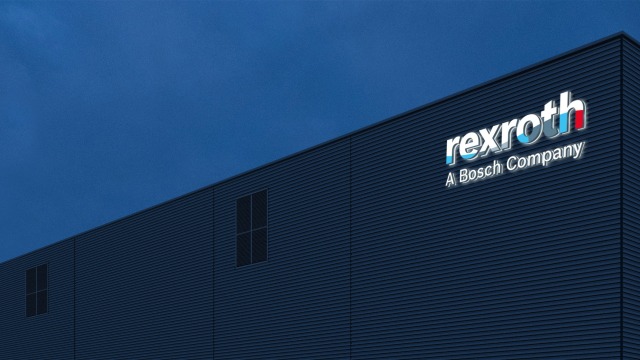



Dr. Mark Krieg, Head of Development within the Industrial Hydraulics Business Unit, Bosch Rexroth AG
Both the manufacturers of machines and systems and end users face increasingly stiff global competition. Investment decisions are made on a more short-term basis and OEMs need to come up with individually tailored machine and system concepts more quickly. Product variance and thus the requirements as regards the adaptability of production systems are increasing. At the same time, system availability is a key factor when it comes to productivity. In addition to all these technical issues, the mechanical and plant engineering sectors – especially hydraulics – are faced with a worsening lack of specialist staff.
The digitalization of hydraulics is the key to coping with these challenges. But it is not an end in itself. Digitalization must either create added value or reduce costs. And it must do so along the entire process chain – from engineering, commissioning and producing the machines and systems to maintenance and repairs.
As soon as engineering begins, Bosch Rexroth provides design engineers with data models for hydraulic components for all marketable engineering suites. Hydraulic systems can be designed quickly and easily with online configurators and the time to market can be significantly reduced as a result.
During commissioning, so-called wizards assist employees with little specialist knowledge of hydraulics. As in the consumer sector, these software assistants guide technicians logically through the commissioning process. What in the past took hours and man days can now be achieved by technicians and even non-specialists in just a few minutes. The CytroBox unit or the autonomous CytroForce axis for example are ready for use in less than 20 minutes. Rexroth is also working on virtual commissioning. Settings parameters obtained using the digital twin can be transferred to the real system which is then ready for use immediately.
When operating hydraulic systems on a daily basis, end users face the challenge of increasing variance in production down to a batch size of 1. They have to change their processes more frequently than ever before. Here too, Bosch Rexroth can provide support with digital aids. Just like in a private setting, technicians can connect to valves and linear axes using Bluetooth. The products can then be adapted according to individual requirements using a mobile phone and the dynamics of a valve for example can be set using a virtual slider.
If tools or materials need to be changed, control parameters can be determined in next to no time with the help of model-based engineering. The operator requires no in-depth knowledge of hydraulic or control systems and non-productive times in production are reduced.
System availability is another lever for increasing productivity. Each machine downtime – especially unplanned downtimes – wastes time and costs money. With the Digital Service Assistant app, maintenance personnel can scan QR codes or, in the case of older products without a QR code, can read the name plate digitally and thus identify the product. This opens up a gateway to the virtual world even for non-connected hardware components and a wide range of information can be retrieved online. In the case of connected systems, the CytroConnect digital service provides assistance: Depending on the development stage, the system status is captured live or anomalies are identified using machine learning algorithms and recommendations for status-based maintenance are given. In addition, remote services can be provided on location without specialists and service engineers can enjoy the benefits of augmented reality. Both of these possibilities are currently being developed.
The digitalization of industrial hydraulics helps OEMs and end users to cope with the challenges of global competition. It creates added value and reduces costs along the entire process chain.
Media Assets
Basic Information Bosch Rexroth
As one of the world’s leading suppliers of drive and control technologies, Bosch Rexroth ensures efficient, powerful and safe movement in machines and systems of any size. The company bundles global application experience in the market segments of Mobile Applications, Machinery Applications and Engineering, and Factory Automation. With its intelligent components, customized system solutions and services, Bosch Rexroth is creating the necessary environment for fully connected applications. Bosch Rexroth offers its customers hydraulics, electric drive and control technology, gear technology and linear motion and assembly technology, including software and interfaces to the Internet of Things. With locations in over 80 countries, more than 29,600 associates generated sales revenue of around 5.2 billion euros in 2020.
Basic Information Bosch
The Bosch Group is a leading global supplier of technology and services. It employs roughly 395,000 associates worldwide (as of December 31, 2020). The company generated sales of 71.5 billion euros in 2020. Its operations are divided into four business sectors: Mobility Solutions, Industrial Technology, Consumer Goods, and Energy and Building Technology. As a leading IoT provider, Bosch offers innovative solutions for smart homes, Industry 4.0, and connected mobility. Bosch is pursuing a vision of mobility that is sustainable, safe, and exciting. It uses its expertise in sensor technology, software, and services, as well as its own IoT cloud, to offer its customers connected, cross-domain solutions from a single source. The Bosch Group’s strategic objective is to facilitate connected living with products and solutions that either contain artificial intelligence (AI) or have been developed or manufactured with its help. Bosch improves quality of life worldwide with products and services that are innovative and spark enthusiasm. In short, Bosch creates technology that is “Invented for life.” The Bosch Group comprises Robert Bosch GmbH and its roughly 440 subsidiary and regional companies in some 60 countries. Including sales and service partners, Bosch’s global manufacturing, engineering, and sales network covers nearly every country in the world. With its more than 400 locations worldwide, the Bosch Group has been carbon neutral since the first quarter of 2020. The basis for the company’s future growth is its innovative strength. At 129 locations across the globe, Bosch employs some 73,000 associates in research and development, of which nearly 34,000 are software engineers.
Press Contact

Spokesperson technology topics
Manuela Kessler
+49 9352 18-4145
Manuela.Kessler@boschrexroth.de